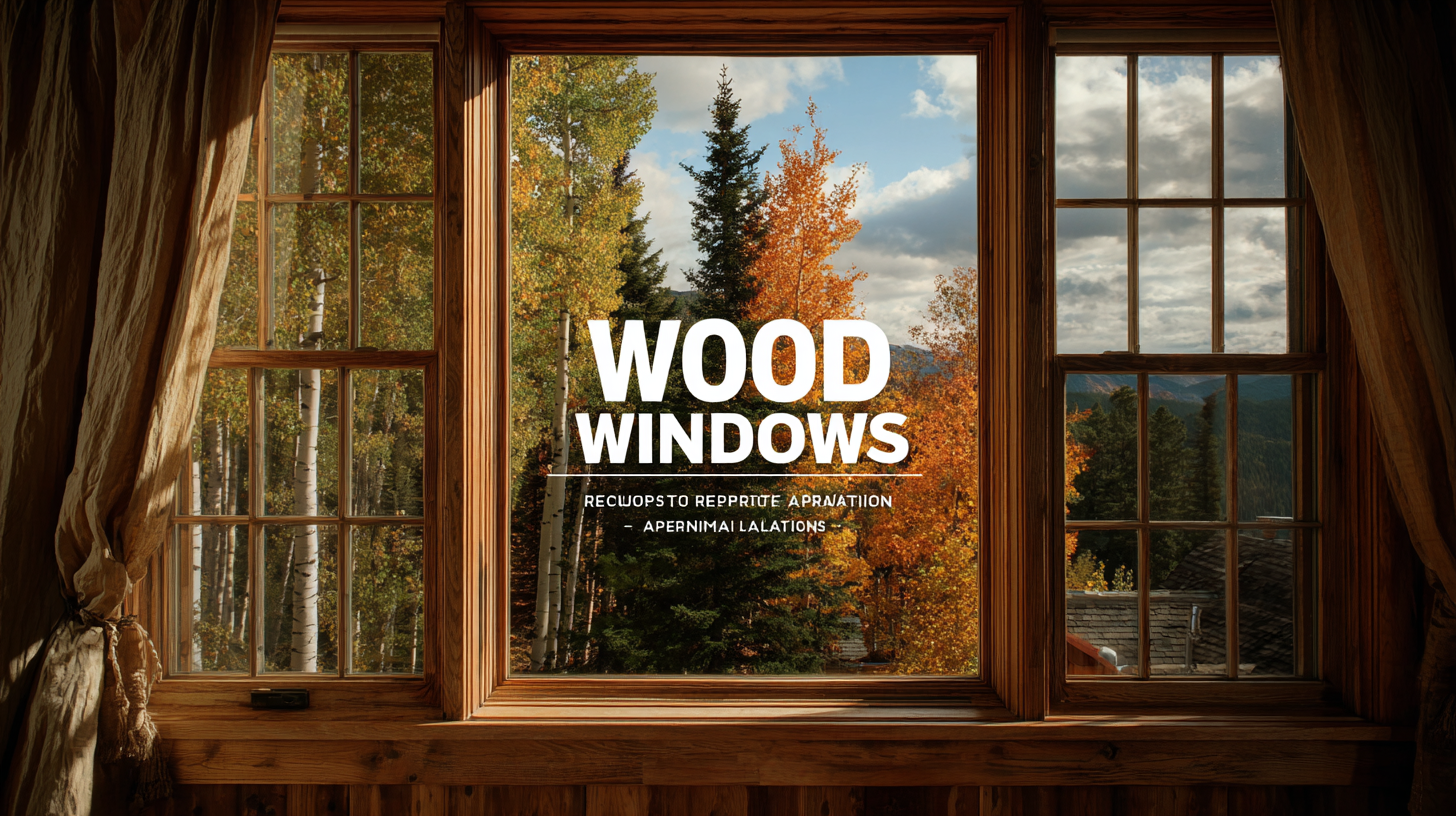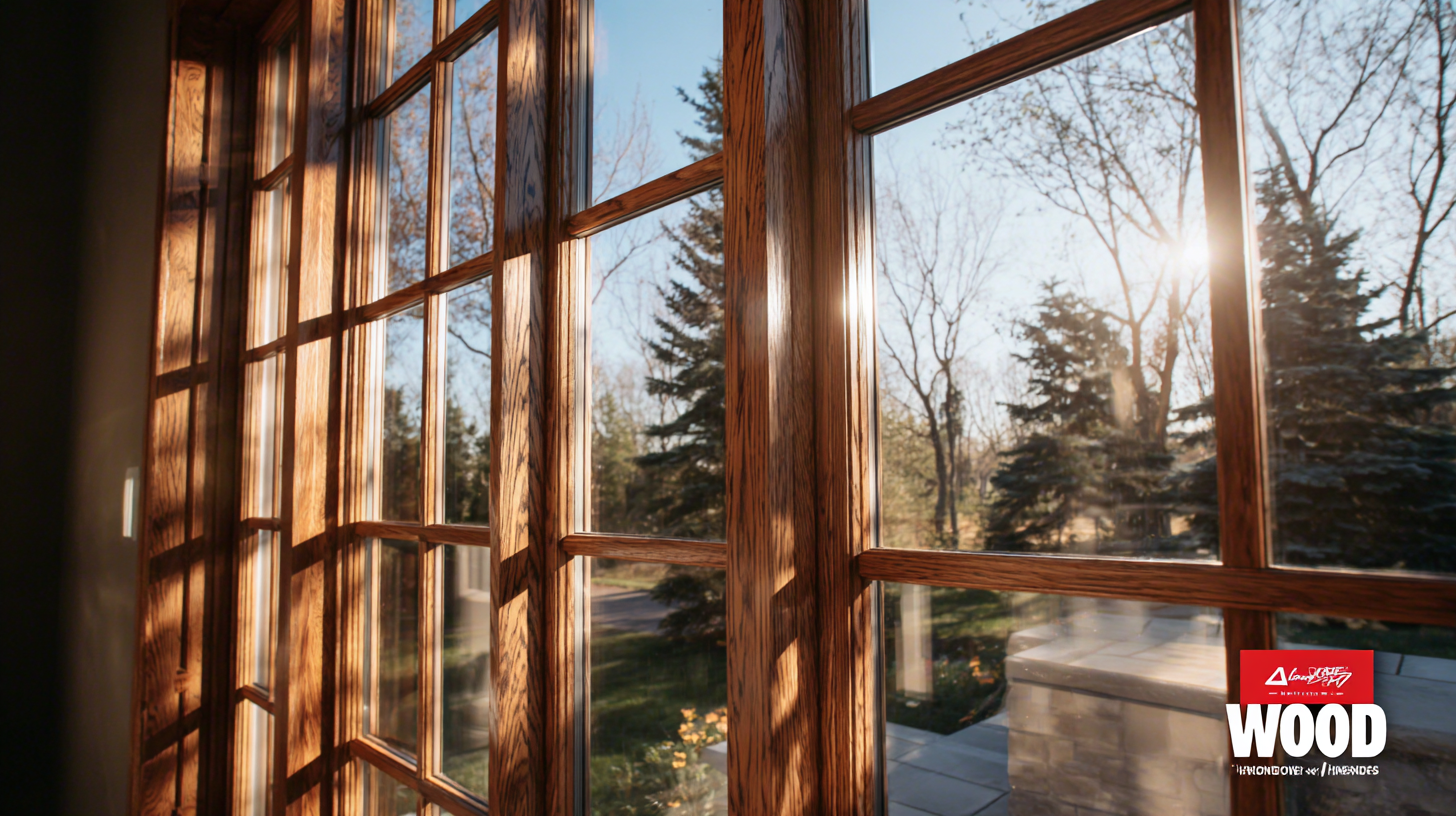 In the realm of home improvement, Wood Replacement Windows have emerged as a popular choice for homeowners seeking a blend of aesthetic appeal and energy efficiency. According to a study by the U.S. Department of Energy, windows can account for up to 25% of a home's heating and cooling costs, making the selection of the right windows crucial for optimal energy performance.
Wood Replacement Windows not only enhance the exterior of a home with their natural beauty and charm but also offer significant thermal insulation benefits, contributing to lower energy bills.
However, potential issues such as moisture absorption and maintenance can arise with wood materials, prompting homeowners to explore the latest advancements and alternatives in window technology.
This blog will delve into the features and benefits of Wood Replacement Windows, identifying their ideal applications while addressing common concerns associated with their use.
In the realm of home improvement, Wood Replacement Windows have emerged as a popular choice for homeowners seeking a blend of aesthetic appeal and energy efficiency. According to a study by the U.S. Department of Energy, windows can account for up to 25% of a home's heating and cooling costs, making the selection of the right windows crucial for optimal energy performance.
Wood Replacement Windows not only enhance the exterior of a home with their natural beauty and charm but also offer significant thermal insulation benefits, contributing to lower energy bills.
However, potential issues such as moisture absorption and maintenance can arise with wood materials, prompting homeowners to explore the latest advancements and alternatives in window technology.
This blog will delve into the features and benefits of Wood Replacement Windows, identifying their ideal applications while addressing common concerns associated with their use.
 When it comes to wood replacement windows, understanding the characteristics of different types can greatly influence your choice. There are primarily three varieties: solid wood, engineered wood, and wood clad windows.
Solid wood windows offer unparalleled beauty and insulation but can be susceptible to warping and rot if not properly maintained. According to the American Architectural Manufacturers Association (AAMA), solid wood windows can provide an R-value of around 3.0 to 4.0, making them an energy-efficient option for homeowners focused on reducing heating and cooling costs.
When it comes to wood replacement windows, understanding the characteristics of different types can greatly influence your choice. There are primarily three varieties: solid wood, engineered wood, and wood clad windows.
Solid wood windows offer unparalleled beauty and insulation but can be susceptible to warping and rot if not properly maintained. According to the American Architectural Manufacturers Association (AAMA), solid wood windows can provide an R-value of around 3.0 to 4.0, making them an energy-efficient option for homeowners focused on reducing heating and cooling costs.
Engineered wood windows, on the other hand, combine the natural aesthetics of wood with enhanced durability. These windows are built from multiple layers of wood, making them less prone to moisture damage and expansion. A study by the National Association of Home Builders (NAHB) reveals that engineered wood windows can last up to 30% longer than traditional solid wood options, making them an appealing investment. Lastly, wood clad windows feature a wooden interior and a protective exterior of aluminum or fiberglass, providing the best of both worlds—traditional charm and modern low maintenance. This hybrid design allows for improved energy efficiency, with reports indicating up to 20% better thermal performance compared to all-wood designs.
When considering wood replacement windows for your home, the benefits are numerous and compelling. One of the primary advantages is their exceptional energy efficiency. Wood naturally insulates, helping to keep your home warm in winter and cool in summer, thereby reducing energy costs. Additionally, wood windows provide excellent sound insulation, making your living space quieter and more comfortable.
Tip: Choose windows with a high-quality seal and double or triple glazing, which can further enhance energy efficiency and soundproofing. When selecting wood species, opt for those that are naturally resistant to moisture and pests, such as cedar or redwood, to ensure longevity and durability.
Another significant benefit of wood replacement windows is their stunning aesthetic appeal. Wood adds a classic and timeless beauty that can enhance the overall look of your home. With various finishes and designs available, you can customize wood windows to match your home's architecture while still enjoying the warm and inviting atmosphere they create.
Tip: Regular maintenance, such as painting or staining, can keep your wood windows in top condition and ensure they remain a focal point of your home’s charm for years to come.
When considering wood replacement windows, understanding the ideal applications for each type is crucial for maximizing their benefits. For traditional homes,
double-hung wood windows offer a classic aesthetic and excellent ventilation control. These windows can seamlessly blend with historic architecture while providing modern energy efficiency.
For contemporary designs, casement wood windows are a perfect choice. They are hinged on the side and open outward, allowing for unparalleled views and exceptional airflow.
Their sleek design complements modern façades and offers easy operation, making them ideal for spaces that prioritize natural light and style.
Tip: Ensure that the wood windows you choose are treated for weather resistance to enhance durability. Additionally, consider pairing your wood windows with energy-efficient glazing to further improve insulation and reduce energy costs.
For homes near coastal areas, opt for specially coated wood windows to withstand humidity and salt air, ensuring long-lasting performance.
Maintaining wood replacement windows is essential for ensuring their longevity and performance. According to the National Association of Home Builders, properly installed and maintained wood windows can last over 30 years, offering energy efficiency and enhancing a home's aesthetic appeal. To maximize their lifespan, homeowners should conduct regular inspections for signs of wear, such as peeling paint or signs of rot, and perform necessary touch-ups or repairs promptly.
Cleaning is another critical aspect of maintenance. The American Institute of Architects recommends using mild detergents and avoiding harsh chemicals that may damage the wood or finish. Additionally, it’s beneficial to apply a protective sealant every few years to shield the wood from moisture and UV damage. Regular maintenance not only preserves the beauty of the windows but also enhances their thermal insulation properties, which can reduce heating and cooling costs by up to 15%, according to Energy Star. By prioritizing these maintenance practices, homeowners can ensure their wood replacement windows remain both functional and beautiful for many years to come.
| Feature | Benefit | Ideal Applications | Maintenance Tips |
|---|---|---|---|
| Energy Efficiency | Reduces heating and cooling costs | Residential homes in all climates | Clean with mild soap and inspect seals annually |
| Aesthetic Appeal | Enhances curb appeal and interior design | Historic homes and upscale communities | Regularly refinish surfaces every few years |
| Customization Options | Tailored designs to fit unique preferences | Custom homes and renovations | Consult with manufacturers for specific finishes |
| Durability | Long-lasting with proper care | Commercial buildings and high-traffic areas | Perform routine checks for wear and tear |
| Sound Insulation | Minimizes outside noise for a peaceful environment | Urban locations and noisy neighborhoods | Ensure proper sealing and weather stripping |
When it comes to installing wood replacement windows, maximizing their performance and longevity starts with understanding the materials and techniques involved. High-quality wood windows not only enhance the aesthetic appeal of a home but also provide excellent insulation, contributing to energy efficiency. A recent industry report indicated that well-insulated windows can reduce heating and cooling costs by up to 30%. This emphasizes the importance of selecting windows that not only look great but also meet energy performance standards.





